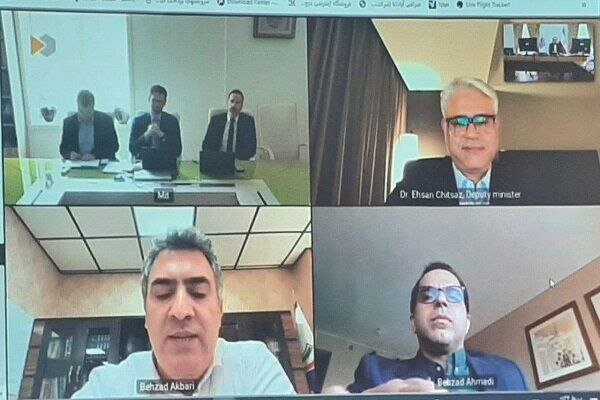Tehran, Belgrade discuss ways to implement co-op in ICT

TEHRAN – Iranian and Serbian officials have discussed potential ways to implement the formerly reached agreements in the Information, Communication, and Technology (ICT) sector.
On February 25-27, an Iranian delegation headed by ICT Minister, Sattar Hashemi paid an official visit to Belgrade at the invitation of his Serbian counterpart, Dejan Ristic.
The officials signed a memorandum of understanding to foster cooperation in the ICT field.
In this line, a meeting was held virtually on Tuesday, focused on data transfer and security, cooperation between private sectors, and experts of the two countries, Mehr news agency reported.
They also stressed benefiting from mutual experiences in the fields of innovation, artificial intelligence, cloud services, and platform economy.
To follow up on the agreements, it was decided to hold technical working groups involving government institutions and private sectors of the two countries. The working groups will be responsible for developing a roadmap for future cooperation and identifying feasible bilateral projects.
In February, Ristic lauded Iran’s progress in the field of space communication, designing, building, and launching sensing and communication satellites.
The official said the meeting with Hashemi had especially focused on establishing and boosting cooperation in scientific and research activities and developing a 5G network.
“We agreed to set up several joint teams as early as after next week to define mechanisms for stepping up cooperation in the IT sector, postal traffic, and e-commerce,” Ristic said.
Hashemi said the signing of the memorandum was another step forward in the development of cooperation.
“This document creates a platform and frameworks for joint investment, development, and research,” he said.
Iran committed to fostering regional AI cooperation
The combination of talent, data, and innovation makes Iran a key player in the regional Artificial Intelligence (AI) value chain, capable of driving meaningful cooperation and development. Iran is committed to fostering regional cooperation and building a future where AI drives prosperity and unity, Hashemi said in February.
Emphasizing that Iran is a major stakeholder in the regional digital landscape, Hashemi said that Iran is a major player in AI in the Persian Gulf and that the country is ready to start cooperation with regional states on this matter.
The official made the remarks while addressing the Iran Corridor 2025 conference held in Dubai, the United Arab Emirates.
He stated that the country’s mobile phone operators, as well as its thriving digital service platforms such as Snapp! And Digikala, each serving more than 30 million users, provides an abundance of multifaceted data — an essential ingredient for AI development, Press TV reported.
Despite facing economic sanctions, Iran has successfully developed a resilient fintech ecosystem that continues to thrive and innovate, Hashemi noted.
“Our country’s academic and research capabilities have propelled us to the forefront of AI advancements. In 2023, Iran ranked second in the region in terms of the number and quality of scientific papers in AI, demonstrating our commitment to cutting-edge research and development,” he added.
“Iran holds the second position in the region for AI developers, highlighting the depth of our skilled workforce, and stands fourth in the region in terms of the number of AI firms, showcasing our dynamic and rapidly growing ecosystem,” the Iranian minister continued.
He underlined that Iranian human capital, available at competitive costs, is a strategic advantage that positions Iran as a valuable partner in regional AI initiatives.
According to Hashemi, by cultivating environments that encourage collaboration and investment, the Persian Gulf region can be turned into a powerhouse of Artificial Intelligence excellence, attracting global tech giants while strengthening intraregional partnerships for shared prosperity.
“By establishing AI acceleration hubs, facilitating joint investment in free zones, and enhancing academic collaboration and elite exchange programs, we can unlock new opportunities for innovation and economic growth,” he noted.
MT/MG
Leave a Comment